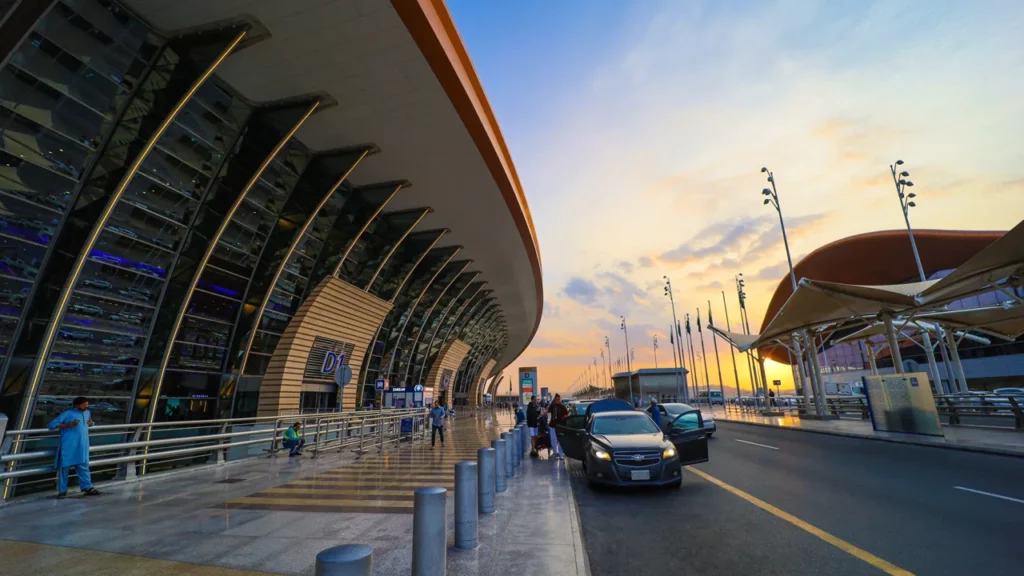
Diplomatic relations between Saudi Arabia and Nigeria have come under scrutiny after 177 Nigerians were refused entry to the country on Monday.
Nigeria’s foreign ministry said only 87 of 264 Nigerian nationals who landed in Jeddah on an Air Peace flight Monday were allowed to enter. All the others had their visas cancelled and were deported.
According to local media reports, some of the passengers were pilgrims hoping to perform the lesser Hajj (the Umrah) in Mecca, the Islamic holy city.
The mass cancellation of visas occurred as Nigera’s President Bola Tinubu was still in Saudi Arabia after holding bilateral talks with the Saudi government.
After a furor on social media, the Saudi embassy in Nigeria said that the affected passengers “didn’t fulfill the entry conditions and requirements in accordance with the applicable rules and regulations of the Kingdom, as they submitted incorrect information to obtain a category of visa that doesn’t apply to them, which was discovered upon their arrival.”
Saudi Arabia requires pilgrims to hold specific travel documents (Umrah or Hajj visas) for pilgrimage. Holders of tourist visas are barred from performing Hajj or Umrah during the Hajj season, according to regulations by the country’s Ministry of Hajj and Umrah.
It’s not immediately clear what type of visas the deported Nigerians had traveled with. However, Air Peace, the Nigerian carrier that flew the Nigerians into Jeddah said it was “shocked” that the visas of its passengers were revoked by Saudi Arabia on arrival because it “strictly followed the profiling procedures stipulated by Saudi Arabian authorities.”
“The visas of all the passengers on the said flight to Jeddah … were checked and verified through the requisite procedures and were vetted to be valid before departure,” the airline said in a statement Wednesday, adding that: “No notice of cancelation or any form of denial from the Saudi authorities was received against any of these passengers despite the live transmission of their details.”
The Saudi statement added the cancellations were not limited to Nigerian citizens, adding that: “… all passengers should review all the documents to determine their conformity with the conditions prior to departing from their countries to the Kingdom.”
‘A diplomatic slap’
Commentators said the incident was embarrassing for Nigeria as its president was still in the country after attending the Saudi-Africa Summit held last Friday. He left Thursday morning for Guinea Bissau for Independence Day celebrations, the presidency said.
“This is obviously a very big diplomatic slap in the face,” Victor Okhai, an advisory board member of the African Diaspora Foundation, a group that advocates the welfare of the African diaspora.
“There was a total lack of sensitivity (by Saudi officials) because the president (of Nigeria) was visiting that country,” Okhai said.
A former Nigerian presidential aide, Reno Omokiri, said Saudi Arabia’s action was “embarrassing” as well as a blight on bilateral relations between both countries.
“Why would the Saudis revoke the visas of over a hundred passengers on an Air Peace flight to Jeddah, especially as Nigeria’s President is currently in Saudi Arabia? That does not augur well for bilateral relations. It is most embarrassing … (and) demonstrates disdain for Nigeria as a whole,” Omokri posted on X, formerly known as Twitter earlier in the week.
Other Nigerians called for the Saudi ambassador to the country to be summoned.
Nigerians have also faced visa entry issues in other countries in the region.
Saudi’s neighbor, the United Arab Emirates, has yet to lift a year-long visa ban on Nigerian travelers despite interventions by Tinubu.
Tinubu’s office released a statement announcing the end of the ban shortly after his meeting with UAE leader Mohamed bin Zayed Al Nahyan in September. However, a UAE official told CNN the embargo was yet to be lifted.
Saudi Arabia is a popular pilgrimage destination for thousands of Nigerian Muslims.
However, Monday’s deportation of Nigerian nationals is not the first time travelers have been refused entry to Saudi Arabia.
In 2012, authorities deported more than 1,000 female pilgrims from Nigeria because they were unaccompanied by male chaperones when they arrived in the country.
Nigeria’s government says it is working to avoid a recurrence.
“Notwithstanding the fact that it is the prerogative of a sovereign nation to determine who is permitted entry into its territory, Nigeria and the Kingdom of Saudi Arabia are traditional and strategic partners, who are willing to guard against reoccurrence of this unfortunate incident,” its foreign ministry said.

